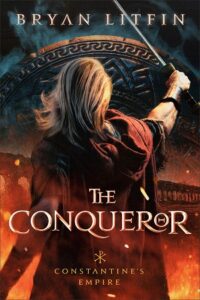What would you say are some areas where ancient Christians might be different from what modern Christians expect?
 It is sometimes the case that modern believers think the early Christians were just like us—what I call “evangelicals in togas.” It’s as if you put your pastor in sandals and a robe, added some green leaves to his hair, and sent him back in time.
It is sometimes the case that modern believers think the early Christians were just like us—what I call “evangelicals in togas.” It’s as if you put your pastor in sandals and a robe, added some green leaves to his hair, and sent him back in time.
We imagine he would fit right in as an “ancient Roman.” Though we all know that’s just silly nonsense, we still tend to think that they were just like us.
Now let me say, in certain basic respects, they were. They worshiped the crucified and risen Jesus just like us. Yet the differences were profound, as well.
Here are a few examples:
We tend to emphasize the cross in salvation, whereas they emphasized the resurrection. Crosses were gruesome and shameful. For them, the “good news” was not only that “Jesus died on the cross” but that he died “and rose again!”
The early Christians never failed to proclaim the resurrection as essential to salvation. The work of Christ did not end at the cross, but only when the light of Easter burst from the empty tomb.
The early Christians also expected hostility from the people around them. Today, Christians in the West have the idea that their culture should tolerate them, or even admire them if they do good things. At the very least, the culture or the government will refrain from outright persecution. And this is because our society does make freedom of religion a human right.
But is that promised to us by God? Just the opposite: Jesus said his followers would be hated by the world. The early Christians lived under the constant threat of persecution. They considered it a possibility even during times when there wasn’t an outbreak.
Cultural hostility is actually the norm for Christians. Buckle up, brothers and sisters, because it might be coming sooner than we think.
The early Christians also had, I think, a greater appreciation for physical things than we do. We tend to think that spiritual things must be immaterial and “from above,” while physical things are lowly and mundane.
But with a profound theology of Incarnation comes a theology that “deifies” all matter, insofar as that matter can be made into a holy vessel to communicate the things of Christ. Common, everyday things like bread and wine can become real vessels of spiritual nourishment.
Likewise, architectural beauty and art are not “extras,” but incarnational means of grace for the good of the church. When the early Christians finally got the chance to start building their own churches, they built grand ones because their vision of God was grand.
They thought He was worth lavish expenditure, like the woman who anointed Jesus’s feet. Christians are supposed to experience physical things as a means of grace—and that is something not all modern evangelicals are aware of.
The Conqueror deals with Constantine, the first Christian emperor. How is Constantine a symbol of the complicated relationship between church and state?
Under Constantine, the ancient church transitioned from an age of persecution to an age of imperial patronage. Instead of being killed by the emperors, Christians suddenly found themselves being favored and having resources and influence.
That can be viewed as both good and bad. Not too long after Constantine—and culminating a process that he began—the empire adopted Christianity as its official state religion and tore down the temples of the idols.
Because this was the first instance of a “state church,” and because that scenario continued for many centuries afterward, Constantine has become a symbol of the union of church and state. That brought a lot of benefits to Christianity, such as theological expansion and numerical growth, not to mention the end of martyrdom.
But did this more comfortable situation water down the vigor and commitment of the earliest church?
How are some of the issues Rex and Flavia deal with similar to those Christians face today?
 The novel’s title is ambiguous. Who is The Conqueror? Constantine? Rex the kick-butt warrior? Or is it Christ himself? And what does he conquer? The Roman Empire? Or your own stubborn heart?
The novel’s title is ambiguous. Who is The Conqueror? Constantine? Rex the kick-butt warrior? Or is it Christ himself? And what does he conquer? The Roman Empire? Or your own stubborn heart?
One of the themes here is that the Lord demands submission to His will, even when it’s very hard. The Christian life can be described as one long, slow trudge toward martyrdom.
Is that gloomy? Well, the Scriptures tell us to crucify the flesh, die to self, fill up in our own bodies what is lacking in the sufferings of Christ. Our Savior suffered and so will we.
We might not have to die for the Lord like the persecuted church, but he might ask some very hard things of us. Is Jesus really your Lord, not just in the good times when obedience is fairly undemanding, but also when he asks for your all—that one thing you don’t think you can give up? That’s when the Lordship of Christ truly means something. Rex and Flavia both wrestle with those themes.
Beyond this, they deal with issues related to friendship and attraction between a believer and unbeliever. (Rex is unconverted and worships the gods.)
There are also issues of when you should obey your parents and when you must plant your flag of independence, as well as spiritual doubts about whether God will deliver you when it really counts. The more things change, the more they stay the same.
In the novel, Rex serves as a speculator (a spy) in the Roman army and witnesses some gruesome things. How does faith complicate his duty as a soldier?
One issue the ancient church was wrestling with was what constitutes a “just war.” Can a Christian soldier fight in the army and kill people? Can he defend the borders against invasion? Who will stop bad men from doing violence if good men don’t oppose them with violence? Or should we always “turn the other cheek” no matter what, letting the bad guys wreak havoc?
So, there is a debate between just war theory versus Christian pacifism. The ancient church was divided on this subject.
The complicating issue with Rex is that he is an unbeliever who doesn’t just witness gruesome things but actually does them—in battle and even in more ambiguous settings where it’s maybe close to murder.
Yet he is being drawn to the peace and love of the gospel. He worships Thor and Hercules. Can peaceful Jesus really be the God for him? And if so, could the Christian God really forgive his bloody acts? And could Flavia love him if she knew about his violent past? It’s a major spiritual trajectory for Rex.
Click for more!


